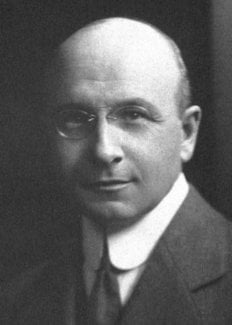Alexis Carrel
Biographical

Alexis Carrel was born at Lyons, France, on June 28, 1873. He was the son of a business man, also named Alexis Carrel, who died when his son was very young.
Alexis was educated at home by his mother Anne Ricard, and also at St. Joseph School, Lyons.
In 1889 he took the degree of Bachelor of Letters at the University of Lyons; in 1890 the degree of Bachelor of Science and in 1900 his Doctor’s degree at the same University. He then continued his medical work at the Lyons Hospital and also taught Anatomy and Operative Surgery at the University, holding the post of Prosector in the Department of Professor L. Testut. Specializing in Surgery, Carrel began experimental work in this subject in Lyons in 1902, but in 1904 he went to Chicago and in 1905 worked in the Department of Physiology in the University of Chicago under Professor G. N. Stewart. In 1906 he was attached to the Rockefeller Institute for Medical Research, New York, as an Associate Member, becoming a Full Member in 1912. In this Institute he carried out most of the experiments which earned him, in 1912, the Nobel Prize in Physiology or Medicine.
During the 1914-1919 War, Carrel served as a Major in the French Army Medical Corps and at this time he helped to devise the well-known Carrel-Dakin method of treating war wounds, which was widely used.
Carrel’s researches were mainly concerned with experimental surgery and the transplantation of tissues and whole organs. As early as 1902 he published, in the Lyons Medical, a technique for the end-to-end anastomosis of blood vessels and in 1910 he demonstrated that blood-vessels could be kept for long periods in cold storage before they were used as transplants in surgery. Earlier, in 1908, he had devised methods for the transplantation of whole organs and later, in 1935, in collaboration with Charles Lindbergh, the airman who was the first to flow across the Atlantic, he devised a machine for supplying a sterile respiratory system to organs removed from the body, Lindbergh having solved the mechanical problems involved. He discussed this aspect of his work and its implications in his book The Culture of Organs. Carrel also published the well-known book entitled Man, the Unknown and, in collaboration with Georges Debelly, a book on Treatment of Infected Wounds.
In collaboration with the French surgeon Theodore Tuffier, who was a pioneer of thoracic surgery, Carrel performed on the heart a successful series of valvotomies, and in collaboration with Burrows he grew sarcoma cells in tissue cultures by the technique of Harrison.
Carrel was honoured by memberships of learned societies in the U.S.A., Spain, Russia, Sweden, The Netherlands, Belgium, France, Vatican City, Germany, Italy and Greece, and by honorary doctorates of the Universities of Belfast, Princeton, California and New York, and Brown and Columbia Universities. He was a Commander in the Legion d’Honneur of France and in the Leopold Order of Belgium, a Grand-Commander in the Swedish Order of the Polar Star, and the recipient of other decorations in orders from Spain, Serbia, Great Britain and the Holy See.
He was married to Anne-Marie-Laure Gourlez de La Motte, the widow of M. de La Meyrie. They had no children.
In 1939, when the Second World War broke out, Carrel went to France as a member of a special mission for the French Ministry of Health, a post which he held for a year. He then became Director of the Carrel Foundation for the Study of Human Problems which was set up by the Vichy Government. While holding this appointment he died in Paris on November 5, 1944.
This autobiography/biography was written at the time of the award and first published in the book series Les Prix Nobel. It was later edited and republished in Nobel Lectures. To cite this document, always state the source as shown above.
The Nobel Foundation's copyright has expired.Nobel Prizes and laureates
Six prizes were awarded for achievements that have conferred the greatest benefit to humankind. The 14 laureates' work and discoveries range from quantum tunnelling to promoting democratic rights.
See them all presented here.
